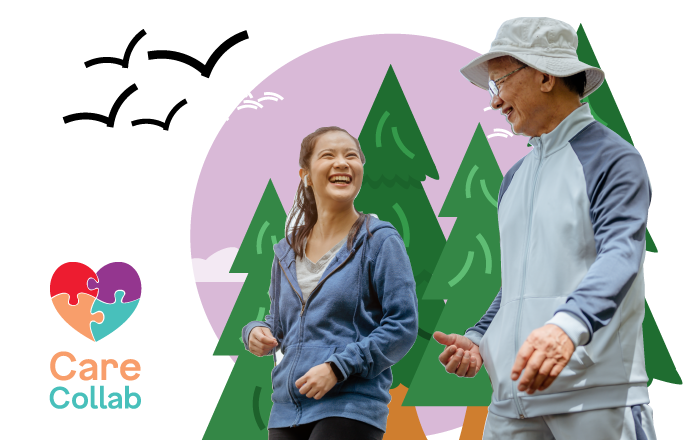Does a professional caregiver REALLY do that???
That was my first thought when I recently discovered some of the things a professional caregiver does for those they look after. I was bent on finding out just how far a caregiver would go to make those under their care comfortable. So, I decided to take a peek at a day in the lives of two qualified caregivers.
Who needs professional caregivers, anyway?
Looking after a family member isn’t easy, as two Singaporeans I know shared previously. If you or a loved one needs help performing basic tasks like dressing, feeding, using the toilet and/or moving around, you may be thinking about hiring a professional caregiver.
In Singapore, CareShield Life, ElderShield and supplements for these schemes give monthly payouts for severe disability which you could use for hiring a professional caregiver.
Before jumping into that, you might be curious about what you’ll be paying for when you hire a pro caregiver. What exactly is a trained caregiver’s role and how far can they go to help you?
Two seasoned caregivers from Homage, which provides on-demand care to seniors and adults, tell all below. Other than sharing what a caregiver typically does, freelance care professionals Christina Quah, 49, and Sheik Fauzmi Fauzul, 28, reveal some pretty surprising stuff about caregiving you probably didn’t know about! Let me just say that they do way more than giving patients medicine and feeding them.
A day in the life of a professional caregiver
How did you get into caregiving?
Christina Quah: Growing up, becoming a professional caregiver was the furthest thing from my mind. My professional background was in auditing, and I detoured from the corporate world to become a full-time homemaker, caring for my two young sons.
When my elderly mother required a hysterectomy, and my father-in-law had to undergo a leg amputation due to diabetes complications, I became their primary caregiver. The responsibilities were demanding, but I was determined to give them the best care possible.
Later, when my personal caregiving responsibilities stabilised and my sons were older and more independent, I decided to return to work. I chanced upon an opening for a care professional and was drawn to the flexible schedule, attractive income and opportunity to deliver a social impact. It felt like the perfect fit for my evolving circumstances and aspirations.
Sheik Fauzmi Fauzul: I’ve been an enrolled nurse for a total of eight years – four at Homage, two at a hospital and another two in a clinic.
My interest in healthcare started when I was in Primary 6. During a lesson about Singapore war heroes, I learnt about Elizabeth Choy, a volunteer nurse during World War II. She was a compassionate war hero who provided food, supplies and medical treatment to prisoners of war, and her noble actions inspired me to pursue nursing.
I love being a care professional because of the fulfilment I get – this pales in comparison to the challenges I sometimes face, like when a new care recipient is not receptive to having a stranger care for them.
What does a normal work day look like?
Fauzmi: I am usually up at 3am for my morning routines, get ready for work at 4.30am and leave home at around 6am. Most days, my first visit starts at 7am and my last visit ends at about 3pm.
I usually have four separate care recipients that I care for. I provide a range of care including assisting with their Activities of Daily Living (feeding, dressing, showering, toileting, walking or moving around, and transferring e.g. from bed to wheelchair) or nursing procedures.
On average, I have three to five visits every day, each ranging in duration depending on the care recipient’s needs. Some of them might be recovering from a stroke, and others may require palliative care or have Parkinson’s disease. I’m home by around 4pm for my evening routine and personal time, and head to bed at about 9pm.
Christina: In the past, I used to manage a higher volume of visits. However, in the last year, I reduced my caregiving workload to one or two care visits a day as I was pursuing a specialist diploma in gerontology (community care support). I planned my time and caregiving visits to harmonise with my family commitments and my studies.
My primary caregiving roles typically involve offering companionship and facilitating physical activity through exercises. Additionally, I provide support with personal care tasks and assist with toileting and showering when needed.
My experience extends to caring for seniors dealing with a range of conditions including Parkinson’s disease, stroke, depression and Obsessive-Compulsive Disorder, assisting them with their ADLs. I also have experience in post-hospitalisation care, ensuring a seamless transition to home-based recovery.
Sounds like caregivers help care recipients with many physical tasks. What else have you done for care recipients or their family members?
Fauzmi: Caregiving is not just limited to helping out with physical tasks.
Offering emotional support or help and advice to the patient/their family members is part and parcel of a care pro’s role. I’ve always felt sympathy for care recipients or the elderly who live alone so I try to engage them in conversation – asking them how their day is and how they are feeling.
Christina: Absolutely! Forming meaningful connections is an integral part of my caregiving philosophy. Whether I’m visiting a regular care recipient, or meeting a new senior, I make the effort to build genuine friendships with them. A significant part of my role involves socialising and engaging in heartfelt interactions.
One of the most rewarding aspects of being a caregiver is knowing that some of these individuals eagerly anticipate my next visit. Knowing that I can bring joy and companionship to their lives is truly indescribable. It is a profound sense of fulfilment – one I hold dear to my heart.
Could you relate a recent work incident that left a lasting impression on you?
Christina: Each and every care recipient I’ve had the privilege of assisting holds a special place in my heart. I’ve gleaned invaluable life lessons from the seniors and their families, and always love hearing their life stories.
One particularly heartwarming memory stands out. Ah Ma, an individual under my care, showed her endearing charm when she quietly sneaked some bites of the food I had cooked and left on her family's dining table. Since it wasn’t quite lunchtime yet, her son had to ingeniously relocate the food to a spot beyond her reach. Isn't she just adorable?
Fauzmi: This year, one of my regular care recipient’s 105th birthday fell on Hari Raya Aidilfitri. Before I could head to my parent’s house for the festivities, I visited the care recipient in the morning for about 1.5 hours as I normally do.
At his house, his helper and I put up birthday decorations, spent time with him and ate birthday cake. During the 1.5 hours, he woke up and said “thank you for coming” before going back to sleep. This was very unexpected as he was always in a sleepy state and would intermittently wake up during the day. The fact that he woke up and acknowledged that we were celebrating his birthday made me realise that he was always aware of my presence even if it didn’t seem like it!
What are some misconceptions about caregiving or things a caregiver does that most people don’t know about?
Christina: I care for seniors with dementia, and families of these seniors generally expect that I will only assist in their loved ones’ ADLs such as toileting, feeding and so on. However, I adopt a person-centred care approach and design my engagement activities according to the senior’s capabilities and preferences.
Before people understood the concept of professional caregivers and started using these services, many assumed we were part-time domestic helpers, sometimes at a cheaper rate due to subsidies.
An elderly lady whom I cared for five years ago thought I was there to replace her domestic helper who was away on a two-week home leave. I was expected to take over the helper’s housekeeping duties – from cleaning the toilets, washing and ironing the laundry to changing curtains.
I asked, “Auntie, if I am behind closed doors, how do I care for you? Your well-being and safety are my concern.” “Never mind me”, she said “you are only here for five hours, there is still lots to do around the house."
Fauzmi: I sometimes provide medical escort services, which is where we accompany care recipients to and from their medical appointments. This is a service that comes as a surprise to many as they often assume caregivers just look after care recipients at home or by their bedside.
List three essential skills for looking after a disabled loved one at home.
Fauzmi: Patience. Disabled individuals will likely move slower than they used to. Show them that you know that they are trying their best and support them. This can really motivate them!
Self care. Caring for a loved one does not mean neglecting your own needs and health. Different people have different ways of coping and taking care of themselves. Spend time doing what you love – be it exercising or playing video games. Take care of yourself before you can take care of others.
Time management. Having a daily routine can help you better manage your time. Planning out your day and knowing when you need to cook, eat, rest, shower or sleep can help minimise stress.
Christina: Other than patience and the ability to give your loved one lots of TLC, it’s important to fully understand their medical history and condition, and know how to prevent falls. It’s also crucial to be able to create organised care plans to minimise caregiver burnout.
Does being a certain gender or age help you be a better caregiver?
Fauzmi: I don’t think being male or being of a certain age helps professional caregivers relate better to certain care recipients. What really counts is taking the time and effort to get to know them – their personality, likes and dislikes, and what motivates them. Understanding their condition and what can help them can only be achieved by frequently spending time with them. For example, a 50-year-old uncle may not necessarily relate to his 20-year-old nephew if they don’t spend any time together.
Christina: Yes, the secret recipe to becoming a good caregiver is really listening to understand, and understanding to be patient.
My background as an auditor equipped me with the skills of being an active listener and understanding what my clients required. You have to listen with your mind and understand with your heart – this is key when trying to build rapport with seniors under my care.
Motherhood has also taught me the significance of patience. True patience arises from having a deep understanding of the individual you are tending to. It involves not only hearing their words, but also empathising with their emotions and needs.
The combination of attentive listening and heartfelt understanding forms the foundation of my caregiving approach.
Final words on caregiving
Considering whether to put your loved one’s well-being in a stranger’s hands is never easy. Asian thinking sometimes equates taking on 100% of caregiving duties with filial piety, however, this can cause burnout and even adversely affect your relationship with someone who’s dear to you.
Getting the help of a professional caregiver could benefit both the care recipient as well as their family members. While the care recipient could benefit from a professional caregiver’s medical expertise, companionship and help in looking after themselves, their family members can benefit from being able to prioritise other responsibilities and their well-being, as well as the assurance of having an organised care plan for their loved one. Both parties also don’t have to worry about their relationship being strained.








